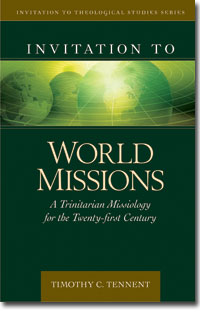The Reformation in Latin America


I recently finished reading Timothy Tennent’s Invitation to World Missions: A Trinitarian Missiology for the Twenty-first Century. There are some good things in this volume, but there are also some serious concerns. Time permitting, I intend to write a full review and submit it to a journal.
For today, I just want to interact briefly with something Tennent writes in chapter 10, “The Flowering of World Christianity, 1910-Present.” In this chapter, he discusses the explosion of Pentecostalism around the world, and especially in Latin America. Tennent views this in a positive light. Here’s a paragraph to give you a taste:
…Latin America is not merely the story of the rise of Pentecostalism and the decline of Roman Catholicism, or the intrusion of Pentecostals into Roman Catholic territory. As with the European Reformation, this new reformation has also stimulated vitality in the Roman Catholic Church, resulting in a renewed emphasis on evangelism and mission. As Roman Catholic missiologist John Gorski has noted, “Evangelization in the specific sense of announcing the Gospel to enable a personal encounter with the living Christ, leading to conversion and discipleship, became a conscious concern of the Catholic Church only within the past half century.” The point is, the Reformation has finally arrived in Latin America! Just as the sixteenth-century Protestant Reformation in Europe challenged and helped to foster the emergence of a new branch of Christianity and to bring reformation to the established church of its day, so today the Pentecostals in Latin America are bringing along the emergence of new Christian movements and the renewal of Roman Catholicism, as well as theological discussions that mirror many of the broad contours of the Protestant Reformation in Europe. (288)
There’s so much askew here. Where to start?
First of all, one of the major problems throughout this book is the author’s view of Roman Catholicism. He believes that Roman Catholics are Christians and that, as Christians, they bring the gospel to the lost. With this position, he denies the necessity of the Reformation. More significantly, he denies the point of Paul’s letter to the Galatians! Because of their denial of sola gratia and sola fide, the Roman Catholics do not have a gospel to bring to the lost. Instead, from a Reformed perspective, they too are in need of the gospel. As the Heidelberg Catechism states it in QA 30, you cannot believe in the only Saviour Jesus if you also seek your salvation or well-being from saints or anywhere else.
Second, to compare the explosion of Pentecostalism in Latin America with the Reformation is unbelievable. The Pentecostalism one finds in Latin America is so rife with errors and heresies that this comparison just doesn’t fly. Much of Latin American Pentecostalism is syncretistic. In Brazil, for instance, many practitioners of African tribal religions are also Pentecostal. Some of Latin American Pentecostalism is heretical on the doctrine of the Trinity. With its view of revelation, Pentecostalism functionally denies sola Scriptura. Their doctrine of salvation is Arminian at best, Pelagian at worst — a denial of the gospel of grace. The list goes on. This is not a Reformation — it’s merely trading in one form of defective religion for another form. To say that Pentecostalism echoes the “broad contours” of the Reformation makes me wonder whether Tennent is failing to understand the teachings of Pentecostalism or the Reformation — or perhaps both?
Finally, let me comment on Tennent’s view of the Reformation. He writes that it “fostered the emergence of a new branch of Christianity.” Here he shows his hand and the game is up. If the Reformation introduced something new, then it really wasn’t a Reformation, but a revolution. The Reformers were not intent on producing “a new branch of Christianity.” They wanted to bring Europe (and the world) back to the old ways — back to the Bible and back to the gospel. Tennent sounds like a sociologist trying to present an “objective” view of things, not a theologian who takes the Bible seriously. I want to ask him two questions: 1) Was the Reformation necessary or not? 2) Is there still a good reason for us to “protest” against the teachings of Rome today?
Thankfully, there really is a Reformation taking place in Latin America. Pentecostals and Roman Catholics are discovering the gospel of grace in Brazil and elsewhere. They are abandoning their Pentecostal and Roman Catholic beliefs and finding comfort in the biblical gospel of Christ. More and more of them are reading the Reformed confessions and finding that these are faithful summaries of God’s Word. The Holy Spirit is opening their eyes to biblical truths like sola gratia, sola fide, sola Scriptura, solus Christus, and soli Deo Gloria. The living Spirit of Christ is producing a true Reformation and I just pray that missiologists like Tim Tennent could see that.


